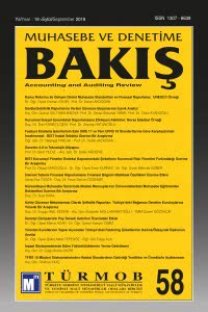REFORM VE MUHASEBE İLİŞKİSİ: MARTIN LUTHER VE THOMAS MÜNZER YA DA MUHASEBENİN BAŞLANGICI ESERİ ÜZERİNDEN BİR İNCELEME
Bu çalışma, Dieter Forte tarafından 1974 yılında yayımlanmış tiyatro oyunu “Martin Luther ve ThomasMünzer ya da Muhasebenin Başlangıcı” eseri incelemesine dayanmaktadır. Eserde Reformunkökenindeki dini, siyasi ve ekonomik ilişkilerinin gelişim süreci üzerinde durulmaktadır. Yazara göre“Söz konusu olan, dört genç insandır. Bunlardan birinin adı Luther, diğeri Münzer, geri kalan ikikişi Karlstadt ve Melanchton’dur. Söz konusu olan, muhasebenin, defter tutmanın kullanılmaya başlanmasıdır.Söz konusu olan, ilk büyük Alman devrimidir. Bu ikisinin aynı zamanda olması, herhalderastlantı değildir.” Yazarın defter tutma ile kastettiği çift taraflı kayıt yöntemidir. Bu bağlamdaçalışmada yazarın bu görüşüne dayanak oluşturan hususlar, muhasebe tarihi literatürü kapsamındadeğerlendirilmektedir. Çalışmanın temel amacı, muhasebenin misyonu hakkında farklı bir bakış açısıortaya koymaktır.
Anahtar Kelimeler:
MUHASEBE TARİHİ, ÇİFT TARAFLI KAYIT YÖNTEMİ, REFORM, KAPİTALİST ZİHNİYET
RELATIONSHIP BETWEEN REFORM AND ACCOUNTING: A REVIEW OF MARTIN LUTHER AND THOMAS MÜNZER OR THE INTRODUCTION OF ACCOUNTING
This study is based on the study of the theater play “Martin Luther and Thomas Münzer or The Introductionof Accounting” published by Dieter Forte in 1974. The work focuses the development processof religious, political and economic relations which are the root of the reform. According to the author,“There are four young people. One of them is called Luther, the other is Münzer, the remaining two areKarlstadt and Melanchton. The issue is the introduction of accounting, bookkeeping. At stake is thefirst great German revolution. It is probably no coincidence that these two happen at the same time.”What the author means by bookkeeping is the double entry method. In this context, the issues thatform the basis of this opinion of the author are evaluated within the scope of accounting history literature.The main purpose of the study is to present a different perspective on the mission of accounting.
Keywords:
Accounting History, Double Entry Method, Reform, Capitalist Mentality,
___
- Aho, J. (2005). Confession and Bookkeeping: The Religious, Moral, and Rhetorical Roots of Modern Accounting. New York: State University of New York Press,
- Akalın ,K.H. (2015). Rasyonel Ekonomik Faaliyetin Muhasebesi Açısından Werner Sombart ve Max Weber. İktisat Fakültesi Mecmuası. Cilt: 65, 2015/2 s, 15-80
- Chester, T.E. (1972). Western Germany - A Social Market Economy. The Three Banks Review, 92, 343-353.
- Daloğlu, P. (2019). 1950’lerden 1980’lere Türk Girişimcisinin Muhasebe Bilgisine Verdikleri Önem ve Değişen Dürüstlük Algısı Çerçevesinde Denetim İlişkileri. Muhasebe ve Denetime Bakış, 61, 279-296.
- Donald D.W.A. . (1975). Compound Interest and Annuities. London: Heineman Publisher. Forell G.W. (1964). Faith Active in Love : An Investigation of Principles Under Lying Luther’s Social Ethics. Minnepolis: Augsburg Publisher.
- Forte, D. (1983). Martin Luther ve Thomas Münzer Ya Da Muhasebenin Bağlangıcı. Çeviren: Şargut Şölçün. İstanbul: Kaynak Yayınları.
- Fülbert, G. (2011). Kapitalizmin Kısa Tarihi. Çeviren: Sadık Usta. İstanbul: Yordam Kitap.
- Güvemli, O. (2007). Mali Tabloların Evrimi. İstanbul: Avcıol Basım Yayın.
- Hiçşaşmaz, M. (1970). Tarihsel Gelişimi İçerisinde Muhasebenin Teorisi ve Teknik Yapısı. Ankara: Tisa Matbaacılık.
- Ijiri, Y. (1989). Momentum Accounting and Triple Entry Bookkeeping; Exporing The Dynamic Structure of Accounting Measurements. American Accounting Association.
- Kaya, M. (2020). Protestan Reformunun Almanya’da Ortaya Çıkış Süreci. Anasay, 11: 171-187.
- Lındberg, C. (2010). Avrupa’da Reform Tarihi: Ortaçağ Avrupası’ndan Modern Avrupa’ya Reformların Tarihçesi. İstanbul: İnkılap Kitabevi.
- Marx, K. (2015). Kapital: Ekonomi Politiğin Eleştirisi, I. Cilt, Sermayenin Üretim Süreci. Çeviren: Mehmet Selik ve Nail Satlıgan. Yordam Kitap.
- Mullet, M. (2010). Historical Dictionary of the Reformation and Counter-Reformation. Plymouth: Scarecrow Press.
- Sangster, A. (2016). TheGenesis of Double Entry Bookkeeping. American Accounting Association, 91:1, 299-315.
- Sombart, W. (2011). Burjuva- Modern Ekonomi Dönemine Ait İnsanın Ahlâkı ve Entelektüel Tarihine Katkı, Çeviren: Oğuz Adanır, Ankara: Doğu Batı 211 Yayınları.
- TARR, R. ve dğ. (2008). Access to History: Luther and German Reformation 1517-55. London: Hodder Education.
- Uçma, T. (2011). Muhasebenin Teorik Yapısı; Genel Bir Bakış. Ankara: Gazi Kitabevi.
- Watson P.S. (1947). Let God be God. An Interpretation of the Theology of Martin Luther. Philadelphia: Fortress Press.
- Weber, M. (2015). Protestan Ahlâkı ve Kapitalizmin Ruhu. Çeviren: Emir Aktan. Ankara: AlterYayıncılık.
- Weber, M. (2011). Toplumsal ve Ekonomik Örgütlenme Kuramı. Çeviri: Özer Ozankaya. İstanbul: Cem Yayınevi.
- Winjum, J.O. (1971). Accounting and The Rise of Capitalism: An Accountant's View. Journal of Accounting Research, 333-350.
- Yaşar, R.Ş. ve Kıymetli Şen İ. (2020). Robinson Muhasebesi ve Homo Economicus. Muhasebe Bilim Dünyası Dergisi. Özel Sayı 2020, 22, 214 – 227.
- ISSN: 1307-6639
- Yayın Aralığı: Yılda 3 Sayı
- Başlangıç: 2000
- Yayıncı: TÜRMOB
Sayıdaki Diğer Makaleler
MUHASEBE ALANINDA GELİŞTİRİLEN UZMAN SİSTEMLER
COVİD-19’UN TÜRK BANKACILIK SEKTÖRÜNDEKİ MEVDUAT BANKALARINA ETKİLERİ
TÜRK TİCARET SEKTÖRÜNÜN2009-2019 DÖNEMİ MALİ YAPI ANALİZİ
TÜRKİYE’DE ENTEGRE RAPORLAMA SÜRECİNDE KARŞILAŞILABİLECEK SORUNLARIN TESPİTİNE İLİŞKİN BİR ARAŞTIRMA
Adalet ZOZİK, Mehmet Zeki DOĞAN
SOSYAL MUHASEBENİN UYGULANABİLİRLİĞİ ÜZERİNE DÜŞÜNCELER
MUHASEBE MESLEĞİNİN DEĞİŞEN DOĞASINDA YETKİNLİK KAVRAMI
Metin ALLAHVERDİ, Hilal Merve ALAGÖZ, ALİ ALAGÖZ
AİLE ŞİRKETLERİNDE VEKALET SORUNUNUN İÇ DENETİM SÜREÇLERİNE ETKİSİ: BİR AİLE ŞİRKETİ İNCELEMESİ
